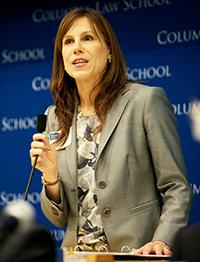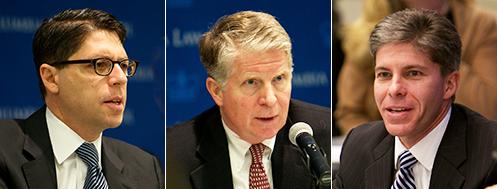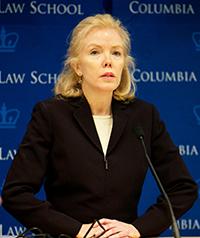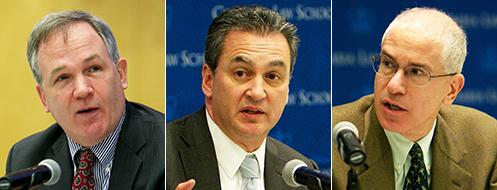Confronting Corruption
Columbia Law School's Center for the Advancement of Public Integrity Hosts Government Officials, Law Enforcement Practitioners, and Watchdog Groups at Conference Exploring Modern Corruption Challenges
New York, November 25, 2014—High-ranking officials from law enforcement and state and federal agencies gathered at Columbia Law School to discuss the challenges of combating corruption in the 21st century during a Nov. 14 conference hosted by the Center for the Advancement of Public Integrity (CAPI).
“One of the great things about America is that we have a baseline understanding that institutions will operate efficiently and that officials will perform their jobs honorably,” said David Harbach, special counsel to FBI Director James B. Comey, who participated in the event alongside other prosecutors and officials from various citizen watchdog groups. “Integrity in government and official processes is foundational.”
| CAPI Executive Director Jennifer G. Rodgers |
Ensuring that integrity is within reach for municipalities and governments around the world is CAPI’s purpose. The research center was formed last year as a partnership between Columbia Law School and New York City’s Department of Investigation (DOI) and is devoted to improving the capacity of public offices and practitioners to deter, identify, and combat governmental corruption. The center expects soon to announce the launch of a first-of-its-kind project describing the corruption laws and oversight structures of all 50 states and the federal government, as well as a members-only forum that will facilitate communication among practitioners.
“Our goal is to support public integrity professionals and to provide that community with training and best practices,” said Jennifer G. Rodgers, CAPI’s executive director and a former federal prosecutor, at the start of the conference.
The event featured leading experts from the anti-corruption field. Harbach was joined on the morning’s first panel, “Views from the Front Lines: Current Corruption Challenges and Responses,” by DOI’s Commissioner Mark Peters and New York County District Attorney Cyrus R. Vance Jr., who each spoke about the role their offices play in battling corruption in New York City.
Peters said DOI, which provided initial funding for CAPI with money returned to it from anti-corruption investigations that resulted in forfeiture proceedings, looks not only at specific criminal conduct but also at ways to eliminate waste and inefficiencies in government that don’t run afoul of the law. Vance drew attention to two New York laws that he said hamper his prosecutors’ ability to do their jobs—automatic immunity for grand jury testimony and a defendant’s right not to be convicted solely based on an accomplice’s testimony.
| (l-r) New York City Department of Investigation Commissioner Mark Peters; District Attorney of New York County Cyrus R. Vance, Jr.; and David Harbach, special counsel to FBI Director James B. Comey. |
Vance said historically anti-corruption prosecutions had been pursued at the local level. He welcomed federal efforts but said both forums are appropriate.
“As a local DA, you can’t cede authority to the federal government because it may have different authorities than you do as a locally elected official,” he said.
A second panel featured a conversation with former U.S. attorneys Patrick Fitzgerald and Michael Garcia, and was moderated by Professor Daniel C. Richman, a former assistant U.S. Attorney in the Southern District of New York.
| CAPI advisory chair Rose Gill Hearn |
CAPI advisory chair Rose Gill Hearn, who was the longest-serving commissioner of DOI before she assumed her present role as a principal at Bloomberg Associates, introduced the panel.
Fitzgerald, former U.S. attorney for the Northern District of Illinois, “created an extraordinarily dynamic and energetic culture during his time as a U.S. attorney,” Hearn said, while Garcia, former U.S. attorney for the Southern District of New York, “has been picked repeatedly for positions of responsibility and sensitivity in his successful and fascinating career.”
Garcia, now chair of the investigatory chamber of the FIFA ethics committee, emphasized the importance of aggressively rooting out corruption to preserve the public’s faith in institutions.
“Danger to the public trust is very difficult to quantify,” he said. “It’s very important that a message be sent with sentencing: You have to pay if you abuse the public trust.”
Fitzgerald, perhaps best known for prosecuting Illinois governors George Ryan and Rod Blagojevich, addressed critics who said indicting political candidates in the 60 days before an election violated an “unwritten rule.”
“In Chicago, corruption can be a volume business, so why shut down for 60 days?” Fitzgerald deadpanned. “When you threaten a witness, we will charge and get handcuffs on you as quickly as possible. It is important for a U.S. attorney to get staff that are apolitical so their charges aren’t questioned.”
| (l-r) Patrick Fitzgerald, former U.S. Attorney for the Northern District of Illinois; Michael Garcia, former U.S. Attorney for the Southern District of New York; and Professor Daniel C. Richman, a former assistant U.S. Attorney in the Southern District of New York. |
The conference also included panel discussions on “Frontiers of Integrity: Understanding Corruption in a Globalized World” and “Seeing Through the Data: Enlisting New Technologies to Protect Public Integrity” with representatives from the Department of Justice’s asset forfeiture section, Transparency International, and the New York City Comptroller, among other agencies and entities.



